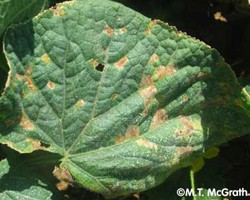2017 Cucurbit Downy Mildew Management Guidelines

Producing a high-quality cucurbit crop necessitates effectively managing downy mildew. This foliar disease is common in the northeast because the pathogen produces a large quantity of asexual spores that are easily dispersed long distances by wind, which enables it to spread widely. There has been no evidence that the pathogen is surviving between growing seasons where winter temperatures kill cucurbit crops (outdoors above the 30th latitude); however, recently both mating types have been found, albeit typically on different cucurbit crop types, thus there is the potential for the pathogen to produce oospores (sexual spores) that could enable the pathogen to survive in northern areas of the USA. The downy mildew forecasting program has documented based on downy mildew occurrence movement of the pathogen throughout the eastern USA each year via its wind-dispersed asexual spores. The pathogen does not affect fruit directly; however, affected leaves die prematurely which results in fewer fruit and/or fruit of low quality (poor flavor, sunscald, poor storability).
The most important component of an effective management program for downy mildew is an effective, properly-timed fungicide program. And the key to that is applying mobile fungicides targeted to the pathogen starting when there is a risk of the pathogen being present. Mobile (or translaminar) fungicides are needed for control on the underside of leaves. Each year there often are changes to the fungicides recommended as the pathogen develops resistance or new products are registered. Because these fungicides have targeted activity, additional fungicides must be added to the program when there is a need to manage other diseases such as powdery mildew. Most targeted fungicides effective for downy mildew are also effective for Phytophthora blight.
The links below contain more information on resistant varieties, developing a diversified fungicide program and timing your sprays, and recommended targeted and protectant fungicides.
Additionally, you will find information for organic management of cucurbit diseases through biopesticides and fungicides for vegetable crops and herbs.
Effectively Managing Cucurbit Downy Mildew in NY in 2017 (pdf; 175KB)
Biopesticides for Managing Diseases of Cucurbits Organically (pdf; 214KB)
Efficacy of Organic Fungicides for Vegetable Diseases and Herbs (pdf; 158KB)

Upcoming Events
Vegetable Pest and Cultural Management Field Meeting for Auction Growers -- Ontario Produce Auction
July 15, 2025
Stanley, NY
This evening meeting will demonstrate pest management in fresh market vegetables in both field and greenhouse (high tunnel) vegetables, primarily for those growing for wholesale auction. A hands-on demonstration of weed, insect and disease identification in vegetables including management options. Details on each topic will focus on field observations at the farm.
Orleans Summer Vegetable Meeting, 2025
July 16, 2025
Waterport, NY
Meeting themes are pest management in a wide array of produce and best practices for pesticide use. Professor Brian Nault will cover allium leaf miner and thrips in onions, garlic, and leeks, and discuss insect challenges in other crops. Bring your questions! We'll also have a field walk that includes high tunnel tomato and cucumber.
DEC credits available: 0.5 in CORE plus either 1.25 in 1a and 23, or 0.75 in 24.
Vegetable Pest and Cultural Management Field Meeting for Auction Growers -- Finger Lakes Produce Auction
July 18, 2025
Penn Yan, NY
This evening meeting will demonstrate pest management in fresh market vegetables in both field and greenhouse (high tunnel) vegetables, primarily for those growing for wholesale auction. A hands-on demonstration of weed, insect and disease identification in vegetables including management options. Details on each topic will focus on field observations at the farm.


































